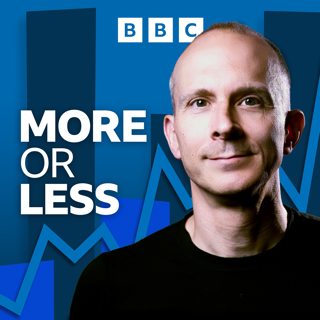
2011 in numbers
A guide to interesting, informative or just plain idiosyncratic numbers of the year. Plus, does probability really exist? Contributors: David Spiegelhalter, Professor of the Public Understanding of Risk at Cambridge University; Owen Spottiswoode, Fullfact.org; Tracey Brown from Sense about Science; Jil Matheson, UK Statistics Authority; George Monbiot; Sir Mark Walport, Director of the Wellcome Trust; Money Box presenter Paul Lewis; Sports Statistician, Robert Mastrodomenico; Dr Linda Yeuh Economics Correspondent at Bloomberg; Stand up Mathematician Matt Parker
30 Dec 201128min

Who are the 1% and the 99%?
Tim Harford on income inequality in the UK, and elsewhere. He speaks to Professor Sir Tony Atkinson of Oxford University; Stewart Lansley, author of 'The Cost of Inequality'; and Professor Donald Boudreaux of George Mason University. Also, David Spiegelhalter, the Winton Professor of the Public Understanding of Risk at Cambridge University explains why he took on what could be his riskiest venture to date - appearing on BBC One's Winter Wipeout. Plus, the magic of maths with magician and Stanford maths professor Persi Diaconis.
23 Dec 201130min

Higgs boson statistics
In the week scientists at the Large Hadron Collider announced that the most coveted prize in particle physics - the Higgs boson - may have been found, Tim Harford hears that the statistical significance is being mis-reported. Plus, the difficulties of cornering a market (especially when the commodity is a 1980s plastic doll). And, Tim Harford talks to author Keith Devlin about how Fibonacci revolutionised trade by introducing medieval businessmen to simple arithmetic.
16 Dec 201129min

Supermarket price wars
Tim Harford on National Literacy Trust figures and the maths of supermarket price wars. Plus, he continues to scrutinise the popular statistics of the Eurozone crisis - do Italian tax payers really shell out 2 billion euros a year for their politicians to be chauffeured around? And, what are the odds of cracking six double-yolk eggs in a row?
9 Dec 201129min

Pensions, and the Eurozone crisis.
In the week of a nationwide strike over pension changes, Tim Harford explains how the government can make public sector pensions sound generous, at the same time the unions can make them sound small. And he finds out why a Greek national statistician is under suspicion of committing crimes against numbers. Plus, is it really true that there are more Porsche Cayenne owners than tax payers declaring an income of more than 55,000 euros in Greece? Also, are affordable homes affordable? And can the whole world fit on the Isle of Wight? Tim tries to cram his studio full of Radio 4 presenters and producers to test the theory.
2 Dec 201128min

Brain Culture Part 3
In a change to our usual format, we are podcasting Matthew Taylor's "Brain Culture" series. The former Number 10 strategy head looks at politics and mind control, asking if new knowledge about the human brain will allow us to make better choices or leave us open to ever more manipulation .
29 Nov 201128min

Brain Culture Part 2
In a change to the usual format, we are podcasting Matthew Taylor's "Brain Culture" series. Matthew Taylor’s series “Brain Culture” continues. The former Number 10 head of strategy asks whether Britain’s education system will be changed by new insights into how human brains learn and retain knowledge.
22 Nov 201128min

Brain Culture Part 1
In a change to the usual format, we are podcasting Matthew Taylor’s series “Brain Culture”. He explores how neuroscience will change society, asking how the justice system will change now that we can scan criminal brains.
15 Nov 201128min





















